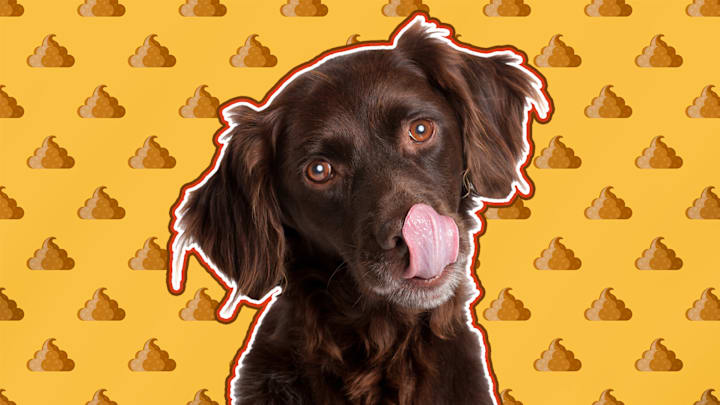Of all the bad habits a dog can have, eating poop just might be the grossest. Seeing your pup snacking on a turd—behavior scientifically known as coprophagia—can be discouraging and frustrating. The good news is that there are actions you can take to stop your dog from eating poop.
Why is my dog eating poop?
There are several reasons your pet might be eating poop. According to a 2018 study, 16 percent of dogs exhibit the crappy behavior; 51 percent of those pups were considered “greedy” eaters by their owners.

Ancestral instinct, behavioral habits, health issues, and pure canine curiosity can all be to blame. Mother dogs may eat poop to clean up after their puppies; grown canines may continue the behavior if their own environment gets too dirty. Dogs may also ingest feces while seeking attention or feeling anxious, or if they’re having digestive issues. Poor digestion can lead to poop that still tastes pretty appealing, as it will be somewhat similar to the food they ate.
Certain breeds are more likely to exhibit the behavior. “We see it a lot with labs and [golden retrievers],” Emma Murdock, dog trainer and owner of Walk With Me in Ottawa, Ontario, Canada, tells Mental Floss. “They tend to put anything in their mouths and they are almost obsessive about eating things.” Other dog breeds may also exhibit the behavior and may show a preference for eating their own poop or that of other animals like cats, deer, rabbit, or geese.
“A lot of the time it’s a genetic type of behavior,” Murdock says. “A dog I raised and trained had puppies and her entire litter, when they were adopted [out to different homes], all started to eat poop at 8 weeks old. To me, that’s a genetic propensity.”
A trip to the vet may be warranted if your dog suddenly has an increased urge to eat poop, especially when the behavior is combined with weight loss. While rare, the habit may develop the animal is dealing with a nutritional deficiency or medical condition that decreases their ability to absorb nutrients—such as exocrine pancreatic insufficiency (EPI), hypothyroidism, Cushing’s disease, or diabetes—although the connection to the poop-eating behavior is not well-understood by veterinarians.
Eating poop may not indicate a medical issue, but it still puts your dog at risk for the transmission of worms, parasites, and diseases like E. coli, parvovirus, and salmonella. That’s why getting the behavior under control is important.
How to Get Your Dog to Stop Eating Poop
Prevention—as in, not allowing your pup to begin eating poop at all—is always the best course of action. This requires a focus on training. “Having really reliable recall is super important for preventing poop eating,” Murdock says. “If I can call my dog and they will come to me no matter what, that’s part of prevention.” Well-learned recall and “leave it” or “no” commands are a big part of nipping poop-eating in the bud.
Murdock stresses the importance of being thorough with this training. “A word has no meaning to a dog until you give it meaning. If you say the word, then guide your dog away, make sure they do not get the item,” she says. “If you say ‘leave it’ and then they eat the poop anyways, you’ve actually just trained them that ‘leave it’ instead means ‘eat the poop.’” If you also have cats, you’ll want to train your dog to stay away from any litter boxes.

There are non-training forms of prevention, too. Make sure you quickly pick up your dog’s poop and keep your yard free of other animals’ scat. People sometimes choose to use a muzzle to stop their pet from gnawing on something gross, but Murdock warns that this is not effective and often only results in “a muzzle full of poop.” She’s also heard of people putting hot sauce on feces as a deterrent, but has yet to see that work, as it’s difficult to be consistent with it. All your dog needs is one taste of hot sauce-free poop and you’re back at square one.
Using an electronic collar is another way to control a dog’s poop-eating habits, especially when your pet is off-leash. According to Murdock, these collars can be a fairly quick way to nip the behavior in the bud. She compares the shock training to an animal being poked by a cactus: Just as a dog would instinctively learn to avoid the sharp plant after being poked, they’ll also learn to stay away from whatever activity caused them to get shocked. “You should 100 percent work with a dog trainer [if using e-collars],” she says. “If you do it wrong or if your timing is wrong, you can create a dog that is suspicious about certain things.”
Ultimately, though, when it comes to stopping your dog from eating poop, there’s only so much a trainer can do for you. “This requires a preventative approach each day,” Murdock says. “Eating poop is one of those things that you will have to be on top of every single day until the habit is broken.”
Read More Stories About Pet Behavioral Issues Here:
